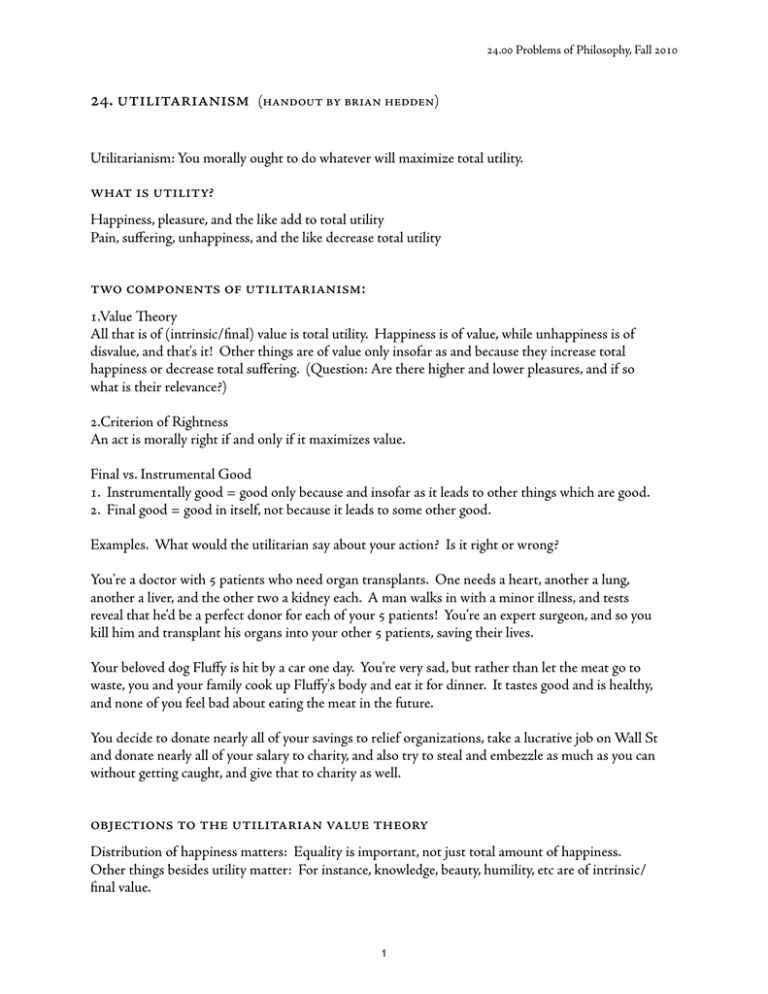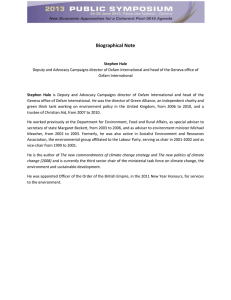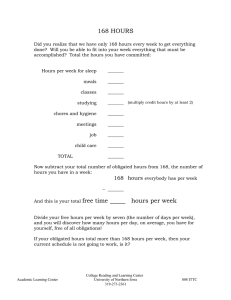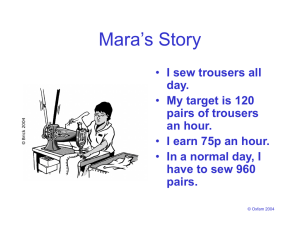.
advertisement

. Problems of Philosophy, Fall . ( ) Utilitarianism: You morally ought to do whatever will maximize total utility. Happiness, pleasure, and the like add to total utility Pain, suffering, unhappiness, and the like decrease total utility : .Value eory All that is of (intrinsic/final) value is total utility. Happiness is of value, while unhappiness is of disvalue, and that's it! Other things are of value only insofar as and because they increase total happiness or decrease total suffering. (Question: Are there higher and lower pleasures, and if so what is their relevance?) .Criterion of Rightness An act is morally right if and only if it maximizes value. Final vs. Instrumental Good . Instrumentally good = good only because and insofar as it leads to other things which are good. . Final good = good in itself, not because it leads to some other good. Examples. What would the utilitarian say about your action? Is it right or wrong? You're a doctor with patients who need organ transplants. One needs a heart, another a lung, another a liver, and the other two a kidney each. A man walks in with a minor illness, and tests reveal that he'd be a perfect donor for each of your patients! You're an expert surgeon, and so you kill him and transplant his organs into your other patients, saving their lives. Your beloved dog Fluffy is hit by a car one day. You're very sad, but rather than let the meat go to waste, you and your family cook up Fluffy's body and eat it for dinner. It tastes good and is healthy, and none of you feel bad about eating the meat in the future. You decide to donate nearly all of your savings to relief organizations, take a lucrative job on Wall St and donate nearly all of your salary to charity, and also try to steal and embezzle as much as you can without getting caught, and give that to charity as well. Distribution of happiness matters: Equality is important, not just total amount of happiness. Other things besides utility matter: For instance, knowledge, beauty, humility, etc are of intrinsic/ final value. 1 . Problems of Philosophy, Fall Desert: It's bad when bad people are happy. It would be worse if Hitler had escaped and was living on a tropical island, even if no one ever found out and everyone still thought he was dead. Total vs. Average Utility – which matters? Side-Constraints: Sometimes we are not permitted to maximize total utility. In particular, we are not permitted to do so if it requires violating someone's rights. Options: Sometimes we don't have to maximize total utility. It's sometimes ok not to give everything to charity, since morality allows us to pursue our own goals and projects. Peter Singer – Strong Obligations of Altruism Even Without Utilitarianism e Child and the Pond : You've just purchased a pair of jeans, and you're walking home past a pond when you notice a child thrashing about, trying not to drown. If you jump in, you'll save the child but ruin your new jeans. If you don't jump in, the child will drown. e Oxfam Case: Oxfam does outstanding charitable work for the neediest people, especially children. You are aware that by giving to Oxfam, you will save at least one child who would otherwise die. P: You are obligated to jump in in e Child and the Pond. P: ere are no morally relevant differences between jumping in in e Child and the Pond and donating in e Oxfam Case. In particular, mere distance is not morally relevant. C: If you are obligated to jump in in e Child and the Pond, then you are obligated to donate in e Oxfam Case. (from P) C: erefore, you are obligated to donate in e Oxfam Case (which is a case we are all in). (from P and C). Singer's Principle: If you can prevent something bad from happening without sacrificing anything of comparable moral significance, then you ought to do it. is principle also entails that you are obligated to donate in e Oxfam Case. Objection: P is false. You're not obligated to jump in, although doing so would be morally admirable. Reply: Really? It would be horrible and repugnant to let the child drown for the sake of your jeans! Objection: P is false. You're the only person who can save the drowning child, but you're not the only person who can donate to Oxfam. 2 . Problems of Philosophy, Fall Reply: Suppose there are actually a number of other people around the pond, but you happen to know that none of them are going to jump in. en, it's just like the Oxfam case, and you're still obligated to jump in. Objection: P is false. e child drowning in the pond is a one-time event, while children suffering in the developing world happens all the time. Reply: Suppose you lived in Minnesota (the land of lakes), and children were routinely drowning in lakes (through no fault of their parents). You'd still be obligated to keep saving them. Objection: We need to have a basic moral code which is not too far beyond the capacities of the ordinary man, or else there will be a general breakdown of compliance with the moral code. Reply: () It's unlikely that telling people to give a lot to relief organizations will lead to a general breakdown of compliance with the moral code. () is only says something about what we should tell the public about morality, not about what's actually morally required. () is sort of consideration may be relevant to the issue of what we should require of others, but not to what we ourselves ought to do. 3 MIT OpenCourseWare http://ocw.mit.edu 24.00 Problems in Philosophy Fall 2010 For information about citing these materials or our Terms of Use, visit: http://ocw.mit.edu/terms.




